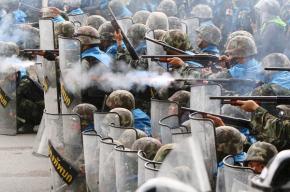Democracy versus dictatorship
Soldiers opened fire with rubber bullets on street protests in Thailand April 28, injuring scores of people in the government's latest attempt to break up protests that have paralyzed the capital city of Bangkok for the last seven weeks.
The protesters, known as Red Shirts, are demanding new elections. Thailand is currently run by politicians who took control of parliament in 2008 after the right mobilized street protests and an airport blockade to oust a democratically elected government. The rightist movement, known as the Yellow Shirts, are based on the middle class, the wealthy, monarchists and the military officers who ousted Prime Minister Thaksin Shinawatra because of his policies that benefited the poor, including the creation of a national health care program.
The Red Shirts, however, have mobilized the rural and urban poor--not simply in support of Thaksin, as the rightists claim, but to demand genuine democracy.
, forced into exile after for publishing articles critical of the Thai monarchy, looks at the issues behind this standoff.
IN A democratic society, when there is a deep crisis, it is customary for the government to dissolve parliament and call elections in order for the people to decide. This happened in Britain and France after mass strikes and demonstrations in the 1960s and 1970s.
After mass Yellow Shirt protests against the government in Bangkok in 2006, Thaksin's Thai Rak Thai government dissolved parliament and called elections. Yet the Democrat Party and others refused to take part in these elections, because they knew they would lose. This led to a military coup. The military wrote their own undemocratic constitution. Fresh elections were held under the control of the military, yet Thaksin's party won an overall majority again. Prime Minister Abhisit Vejjajiva's government is only in power by using two judiciary coups, Yellow Shirt violence at Government House and the airports, and the actions of the army. It has never been elected.
So why are the government and their elite friends refusing to dissolve parliament and call immediate elections? They brush aside this simple Red Shirt demand. Instead they bring armed soldiers and tanks on to the streets to break up an unarmed pro-democracy protest. So far, at least 27 people have died this year.

This is what the Thai crisis is all about. It is about democracy versus dictatorship. It is also about equality.
Let us look at the justification for refusing an election. It is the same as the justification for the 2006 coup. Basically, the elites claim that the majority of ordinary people in Thailand are too poorly educated and too stupid to be allowed a free vote. They claim that they are all "bought" by Thaksin. It is the same old story throughout the history of democratic struggles in the world. The poor are always insulted in this way. Only the privileged classes and middle classes are deemed to be mature enough to vote.
The government and the military have now announced that the entire Red Shirt leadership is "republican" and therefore it is "okay" to shoot everyone. Yes, I am a republican, but the Red Shirt leaders are, unfortunately, not. Tell a huge lie about the Red Shirts so you can kill them "with legitimacy."
This is what Abhisit means by "democracy." In Thailand, it is now a capital offense to have political views which differ from the royalist elites. This means that no one can tell if most Thais love the king or not. The chances are that millions of ordinary people now hate the monarchy because of what has been done in its name. The tyrants can only react with violence, lies and censorship. That is a sign of desperation.
So why are the NGOs and academics claiming that both sides in Thailand must "avoid violence" and "take responsibility"? Which side has the guns and tanks? Which side is refusing democratic elections? Would they have said this about the Peoples Power movement in the Philippines? Do they accuse Aung San Suu Kyi and the Buddhist monks of being equally responsible for the violence in Burma? Were the students in Tiananmen Square "responsible" for their own deaths? Why are the NGOs and academics not backing simple demands for democracy?
The answer is that the NGOs and academics do not believe in voting or the democratic process. They have become members of the elite class and are uncomfortable about the self-empowerment of the poor. When the poor fight back, they quickly run to the side of the elites. There was once a time when NGO activists were on the side of the poor and the oppressed against tyranny. Unfortunately, all that has now changed.
Thailand will never be the same. What will happen, no one knows. But this is a revolutionary situation with a potential for freedom, democracy, social justice...or barbarism.


